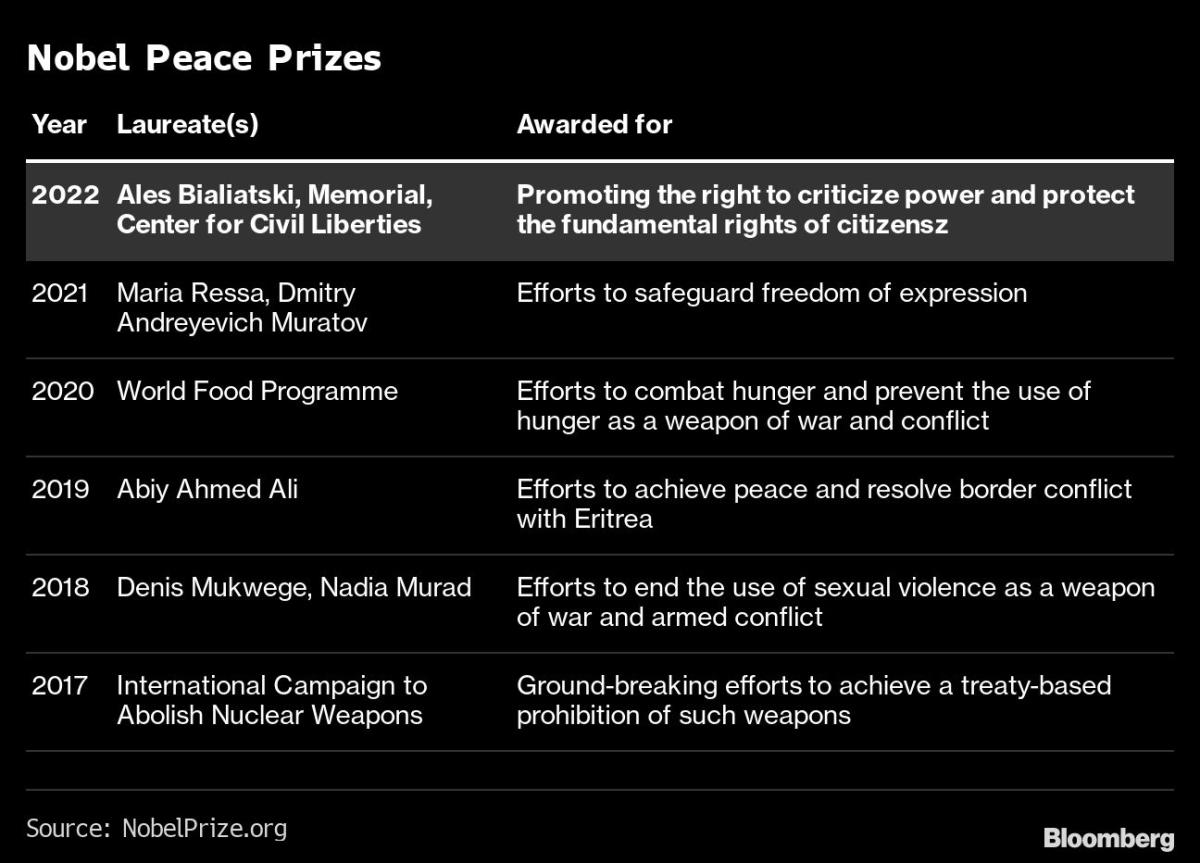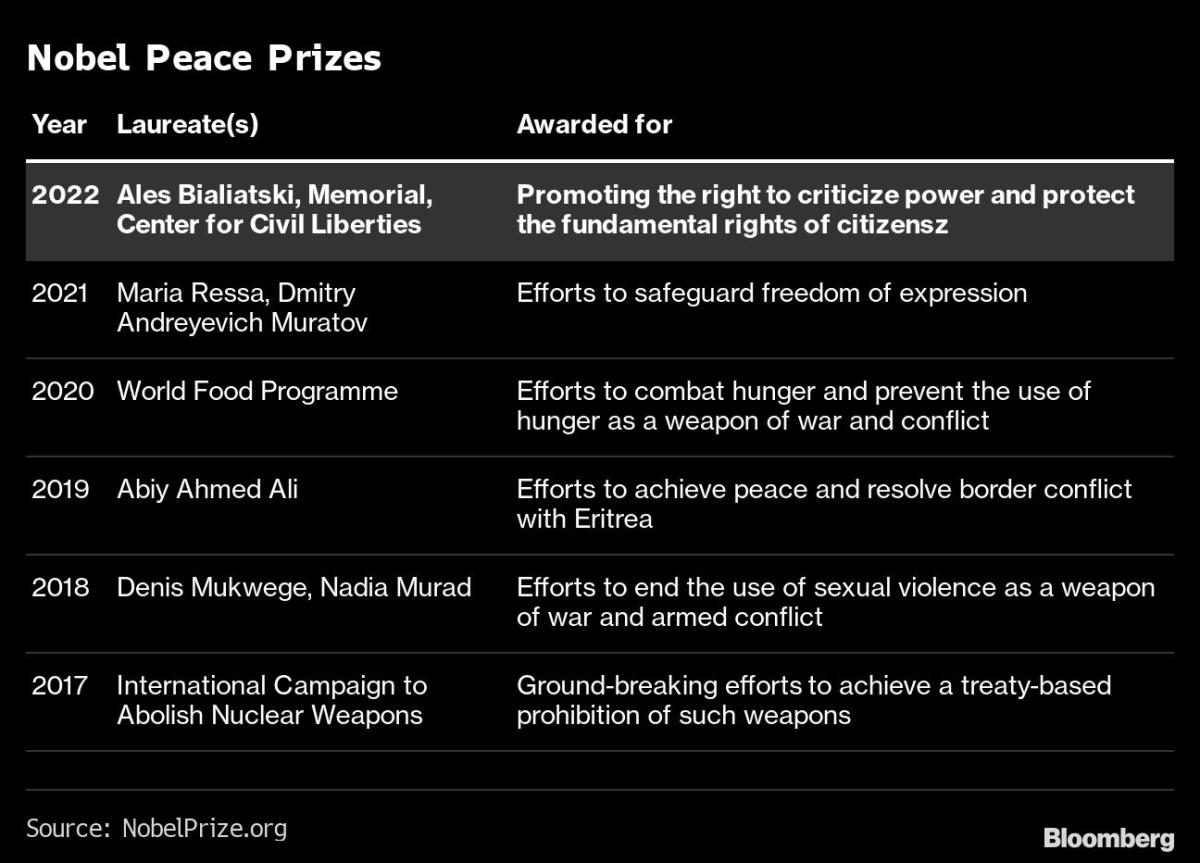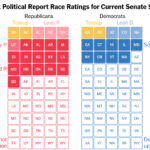
(Bloomberg) — Human rights advocates in the former Soviet neighbors of Belarus, Ukraine and Russia won the Nobel Peace Prize for their efforts to fight authoritarian regimes as Europe’s worst military confrontation since World War II is roiling the region.
Most Read from Bloomberg
Ales Bialiatski from Belarus, Memorial of Russia and Ukraine’s Center for Civil Liberties were awarded the 10-million Swedish kronor ($900,000) prize by the Oslo-based Norwegian Nobel Committee on Friday.
The committee “wishes to honour three outstanding champions of human rights, democracy and peaceful co-existence,” it said in a statement. “This year’s laureates have revitalised and honoured Alfred Nobel’s vision of peace and fraternity between nations — a vision most needed in the world today.”
The announcement was unexpected, with opposition leaders in Belarus and Russia, Sviatlana Tsikhanouskaya and Alexey Navalny — both vocal critics of Moscow’s invasion of Ukraine — long tipped as potential winners. Coming on the day Vladimir Putin celebrates his 70th birthday, it awards the prize to a critic of the Russian president’s regime for the second year in a row.
Ales Bialiatski, 60, is the chairman of Viasna, a non-governmental center that has tracked human rights violations since 1996. Bialiatski was detained last year in President Alexander Lukashenko’s ongoing repression of the opposition following nationwide protests against his claimed landslide victory in the 2020 election. Viasna is effectively outlawed in Belarus, with seven of its members imprisoned, including Bialiatski. There are more than 1,300 political prisoners in Belarus, according to Viasna.
“Government authorities have repeatedly sought to silence Ales Bialiatski,” the committee said. “Since 2020, he is still detained without trial. Despite tremendous personal hardship, Mr Bialiatski has not yielded an inch in his fight for human rights and democracy in Belarus.”
Bialiatski is the second citizen in Belarus’s independent history to receive a Nobel Prize after Svetlana Alexievich won the award in literature seven years ago.
Last year’s winners were journalists Maria Ressa and Dmitry Muratov, with the latter suspending publication of his newspaper in Russia in March after the passage of legislation criminalizing independent reporting on the war. He auctioned his Nobel medal in June for $103.5 million to raise funds for Ukrainian refugees.
The Center for Civil Liberties in Ukraine has been pushing for the country to join the International Criminal Court. It has been involved in identifying and documenting Russia’s war crimes against civilians since Putin’s full-scale invasion in February.
“We faced unprecedented numbers of war crimes, which were not documented,” said Olexandra Matviychuk, the head of the organization. “That is why my colleagues and I worked out a screening methodology and involved ordinary people to document witnesses.” She said their database has more than 19,000 war crime episodes by now.
Memorial, a group founded by Soviet-era dissidents including Nobel Peace Prize laureate Andrei Sakharov, was ordered to shut down earlier this year on the grounds that it failed to identify itself as a “foreign agent” under Russian law.
Its staff members were expected to hold a news conference on Friday outside the Moscow court where the hearing on the seizure of their office was being held. Their initial reaction to winning the prize, posted to Instagram: “For now, we have no words.”
Memorial catalogs political repression ranging from mass purges and the Gulag prison system of former Soviet dictator Josef Stalin to the persecution of dissent in contemporary Russia under Putin.
“This prize is not addressing President Putin, not for his birthday or in any other sense, except that his government and the government in Belarus is representing an authoritarian government that is suppressing human rights activists,” Berit Reiss-Andersen, chair of the committee, told reporters in Oslo. “We always give a prize for something and to somebody, and not against anybody.”
Previous laureates include Mother Teresa, Nelson Mandela, Barack Obama, Martin Luther King and the European Union.
Annual prizes for achievements in physics, chemistry, medicine, peace and literature were established in the will of Alfred Nobel, the Swedish inventor of dynamite, who died in 1896. The prize in economic sciences was added by Sweden’s central bank in 1968.
(Updates with details from third paragraph.)
Most Read from Bloomberg Businessweek
©2022 Bloomberg L.P.




